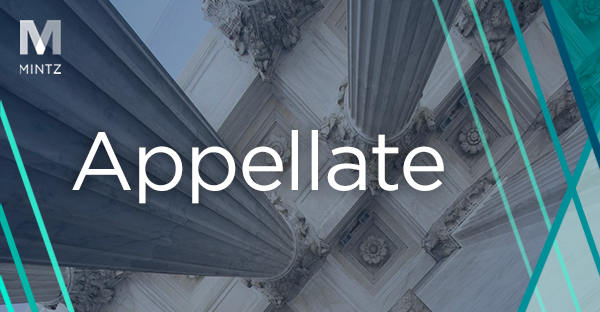
Litigation & Investigations
Viewpoints
Filter by:
Sustainable Energy & Infrastructure Litigation Updates — November 2025
November 4, 2025 | Article | By Jacob Hupart
We cover noteworthy developments in federal regulation and civil litigation impacting ESG initiatives.
Sustainable Energy & Infrastructure Litigation Updates — June 2025
June 2, 2025 | Article | By Jacob Hupart
DOJ: ‘False Claims Act + Cybersecurity’ Is Here To Stay
April 3, 2025 | Blog | By Scott Lashway, Karen Lovitch, Matthew Stein
Amid ongoing policy shifts in Washington, the federal government’s interest in pursuing civil cyber-fraud cases appears to be here to stay.
DOJ Reinforces Emphasis on Voluntary Self-Disclosure With Latest Updates to the Evaluation of Corporate Compliance Programs Guidance
October 7, 2024 | | By Eoin Beirne, Nick A. LaPalme, Karen Lovitch
On September 23, 2024, the Criminal Division of the United States Department of Justice (“DOJ” or the “Department”) revised its Evaluation of Corporate Compliance Programs guidance (the “ECCP”). This article focuses on significant revisions detailed in the most recent installment of the guidance.
The New Private Equity Post-Acquisition Paradigm
October 1, 2024 | Alert | By Eoin Beirne
Read about DOJ recent scrutiny of private equity deals, its initiatives aimed at increasing acquirer oversight of M&A transactions, and best practices for private equity sponsors in the current enforcement landscape.
Supreme Court in Jarkesy Limits the SEC’s Powers to Use In-House Administrative Courts
June 28, 2024 | Blog | By Matthew Levitt, Patrick E. McDonough
Yesterday, the Supreme Court issued its decision in the closely-watched SEC v. Jarkesy, holding that the SEC could no longer seek civil monetary penalties for fraud in its in-house courts consistent with the Seventh Amendment, which grants the right to a jury trial and thus requires such cases to be heard in federal court. The Supreme Court’s decision has potentially profound implications, not only for the SEC’s regulation of the securities industry, but for dozens of federal administrative agencies that, depending on the authorizing statute, can or must impose civil penalties through administrative proceedings.
DOJ Announces it is Designing a Whistleblower Rewards Program
March 18, 2024 | Blog | By Eoin Beirne, Karen Lovitch, Brian Dunphy, Nick A. LaPalme
In early March 2024 at the American Bar Association’s 39th National Institute on White Collar Crime, Deputy Attorney General (DAG) Lisa Monaco’s keynote remarks previewed the development of new and significant Department of Justice (DOJ or the Department) policy initiatives. Her speech reemphasized many of DOJ’s key themes throughout the current administration, including individual accountability, the importance of strong corporate compliance programs, incentivizing voluntary self-disclosure of misconduct, and adapting to keep up with disruptive technologies such as artificial intelligence.
DOJ Announces New M&A Safe Harbor Policy
November 28, 2023 | Blog | By Eoin Beirne, Nick A. LaPalme
Throughout 2023, the Department of Justice has prioritized voluntary self-disclosure of misconduct. The introduction of the M&A Safe Harbor Policy extends these principles to mergers and acquisitions, emphasizing the pivotal role of effective compliance programs. White Collar Defense and Government Investigations Practice Co-chair Eoin Beirne and Associate Nick LaPalme present a high-level summary of the policy, offering valuable insights into its implications for companies navigating the complexities of mergers and acquisitions.
Judge Rakoff puts the Ripple Party on Ice as the Crypto Community and SEC Ponder their Next Moves
August 7, 2023 | Blog | By Cory S. Flashner, David Adams, Edmund P. Daley, Patrick E. McDonough
Just barely two weeks ago, we wrote about the half-victory for Ripple Labs in its ongoing litigation with the Securities and Exchange Commission (“SEC”), in which Judge Analisa Torres granted partial summary judgment in favor of Ripple on the issue of whether certain sales of Ripple’s XRP cryptocurrency tokens were “securities” under the federal securities laws. Some in the crypto industry interpreted her ruling to mean that secondary transactions in crypto assets on centralized and decentralized crypto exchanges were not transactions in “securities,” even though Judge Torres expressly declined to address the secondary trading issue. Fast forward to today, and a new ruling out of the SDNY against Terraform Labs casts further doubt on this interpretation.
Lessons from Disney: The Exercise of the Corporate Voice is Protected Business Decision
August 2, 2023 | Blog | By Patrick E. McDonough, Kaitlyn Crowe
In the ever-changing and divisive political climate facing our nation today, boards of directors and the companies they oversee face myriad pressures from numerous stakeholders to weigh in on specific political, cultural, and social issues. Helpfully, a recent decision by the Delaware Chancery Court determined that a board’s decision to utilize the company’s voice and speak out about the pertinent issue is a “business decision” by the Company.
Losing Your International Shoe: Corporations May Waive Contacts-Based Personal Jurisdiction in Consent-by-Registration States
July 13, 2023 | Blog | By John Dougherty, Mitchell Clough
Late last month the Supreme Court of the United States opened the door to a potential sea change in personal jurisdiction over corporate entities. In Mallory v. Norfolk Southern Railway Company, the Court held that any corporation registered to do business in a state which requires out-of-state businesses to consent to general personal jurisdiction waives its right to assert a Due Process challenge to jurisdiction in that state. Thus, businesses registered to do business in such states can be sued there, even if none of the events underlying the lawsuit took place in that state.
Recent Second Circuit Opinion Underscores the Importance of Engaging Experienced Counsel to File and Perfect Class Action Claims
July 11, 2023 | Blog | By Joel Rothman, Peter M. Saparoff
The U.S. Court of Appeals for the Second Circuit (“Second Circuit”) recently issued an important decision concerning challenging the rejection of claims made by class members in settled U.S. class actions. Contant v. AMA Cap., LLC, No. 21-3058 (2d Cir. Apr. 14, 2023). In sum, the Second Circuit affirmed the decision of the U.S. District Court denying a class claimant’s (the “Claimant”) request for the court to overturn the claims administrator’s rejection of the Claimant’s claims.
Don’t Text and Trade: Regulators Crack Down on the Use of Improper Communication Channels
June 20, 2023 | Blog | By Pete Michaels, Alyssa C. Scruggs, Yasmin Turco
Registered reps beware: your personal device or messaging account is not the right place to conduct your business affairs, and regulators have made clear that they will not look the other way. In particular, the Financial Industry Regulatory Authority (“FINRA”) and member firms are cracking down on improper communication recordkeeping practices and the use of non-firm applications, including text messages, to communicate with clients.
The Supreme Court Solidifies the Securities Act’s Tracing Requirement For Section 11 Plaintiffs
June 9, 2023 | Blog | By Doug Baumstein, Jason Vigna, Ellen Shapiro, Aaron R. Megar
Last week, the U.S. Supreme Court solidified the “tracing” requirement for private plaintiffs to be able to assert Section 11 claims pursuant to the Securities Act of 1933, holding that plaintiffs asserting such securities fraud claims must show that they own stock that was issued pursuant to an allegedly misleading registration statement—even though such tracing may be impossible in the context of a direct listing. In effect, the decision likely protects future direct listings from Section 11 liability so long as the direct listing does not involve a “lock-up period” pursuant to which unregistered and registered shares enter the market at different times.
No More Mr. Nice BI: Reg BI Violation Leads to Expulsion for FINRA Member Firm
May 19, 2023 | Blog | By Pete Michaels, Alyssa C. Scruggs
The Financial Industry Regulatory Authority (“FINRA”) has acted on its promise to bring Reg BI to life, announcing last week that it has expelled member firm SW Financial, as well as disciplined its CEO and majority-owner, Thomas Diamante. See FINRA Press Release.
Heightened Risk for Banks as Account Fees Land on “Junk Fee” Agenda
May 11, 2023 | Blog | By Keith Kollmeyer, Alyssa C. Scruggs, Caroline B. Enright
Banks and financial institutions beware: an increased focus on so-called “junk fees” has litigants and regulators alike taking aim at checking account and deposit fees. Although recent political focus on “junk fees” has been aimed more squarely at the entertainment, travel, and other related industries, bank fees are in the crosshairs and the landscape is rapidly changing. Banks and financial institutions ought to heed recent developments and take renewed steps to review account agreements and current practices to minimize risk in the collection of routine fees.
U.S. Supreme Court Grants Cert in ADA “Tester” Case
May 3, 2023 | Blog | By Todd Rosenbaum, Adam B. Korn, Sebastian Navarro
In late March, the United States Supreme Court granted certiorari involving a case that could have a nationwide impact on lawsuits brought under Title III of the Americans with Disabilities Act (“ADA”).
District Courts Will Hear Constitutional Challenges to SEC and FTC Admin Courts
April 19, 2023 | Blog | By Ellen Shapiro
Last week, the U.S. Supreme Court paved a path for petitioners to assert constitutional challenges to the structure of U.S. Securities and Exchange Commission (“SEC”) and U.S. Federal Trade Commission (“FTC”) administrative hearings in federal courts.
The Last Remaining FX Defendant Prevails at Trial
April 5, 2023 | Blog | By Elizabeth M. Platonova, Joel Rothman
Class Plaintiffs in the case of In re Foreign Exchange Benchmark Rates AntiTrust Litigation alleged that Defendant banks conspired to fix prices in the foreign exchange (“FX”) market in violation of Sections 1 and 3 of the Sherman Antitrust Act. All but one of the Defendant banks settled several years ago for a total of $2.3 billion. Defendant Credit Suisse decided to proceed to trial, and on October 20, 2022, a Manhattan federal jury found that Credit Suisse played no part in a conspiracy to fix the foreign currency exchange market.
It’s Going to be a Big Year for FINRA
March 21, 2023 | Blog | By Pete Michaels, Alyssa C. Scruggs
After bringing its first disciplinary action related to Regulation Best Interest (“Reg BI”) back in October 2022, the Financial Industry Regulatory Authority (“FINRA”) has made it clear that compliance with the long-dormant regulation will be a significant focus of the regulator’s attention this year. Bill St. Louis, FINRA’s Executive Vice President and Head of the National Cause and Financial Crimes Detection Program, announced last week that FINRA intends to conduct Reg BI compliance examinations of 1000 broker-dealers – or just under one-third of FINRA’s member firms – by the end of the year.
Explore Other Viewpoints:
- Data Centers & Digital Infrastructure
- AI: The Washington Report
- Antitrust and Federal Regulation
- Appellate
- Arbitration, Mediation & Alternate Dispute Resolution
- Artificial Intelligence
- Awards
- Bankruptcy & Restructuring
- California Land Use
- Cannabis
- Class Action
- Complex Commercial Litigation
- Construction
- Consumer Product Safety
- Corporate Governance (ESG)
- Cross-Border Asset Recovery
- DEI Legal Developments
- Debt Financing
- Direct Investing (M&A)
- Diversity
- EB-5 Financing
- Education & Nonprofits
- Employment
- EnforceMintz
- Environmental (ESG)
- Environmental Enforcement Defense
- Environmental Law
- Environmental, Social, and Corporate Governance (ESG)
- FDA Regulatory
- False Claims Act
- Federal Circuit Appeals
- Financial Institution Litigation
- Government Law
- Growth Equity
- Health Care
- Health Care Compliance, Fraud and Abuse, & Regulatory Counseling
- Health Care Enforcement & Investigations
- Health Care Transactions
- Health Information Privacy & Security
- IP Due Diligence
- IPRs & Other Post Grant Proceedings
- Immigration
- Impacts of a New US Administration
- Insolvency & Creditor Rights Litigation
- Institutional Investor Class Action Recovery
- Insurance & Financial Services
- Insurance Consulting & Risk Management
- Insurance and Reinsurance Problem-Solving & Dispute Resolution
- Intellectual Property
- Investment Funds
- Israel
- Licensing & Technology Transactions
- Life Sciences
- Litigation & Investigations
- M&A Litigation
- ML Strategies
- Managed Care
- Medicare, Medicaid and Commercial Coverage & Reimbursement
- Mergers & Acquisitions
- Patent Litigation
- Patent Prosecution & Strategic Counseling
- Pharmacy Benefits and PBM Contracting
- Portfolio Companies
- Privacy & Cybersecurity
- Private Client
- Private Equity
- Pro Bono
- Probate & Fiduciary Litigation
- Products Liability & Complex Tort
- Projects & Infrastructure
- Public Finance
- Real Estate Litigation
- Real Estate Transactions
- Real Estate, Construction & Infrastructure
- Retail & Consumer Products
- Securities & Capital Markets
- Securities Litigation
- Social (ESG)
- Special Purpose Acquisition Company (SPACs)
- Sports & Entertainment
- State Attorneys General
- Strategic IP Monetization & Licensing
- Sustainable Energy & Infrastructure
- Tax
- Technology
- Technology, Communications & Media
- Technology, Communications & Media Litigation
- Trade Secrets
- Trademark & Copyright
- Trademark Litigation
- Unified Patent Court (UPC)
- Value-Based Care
- Venture Capital & Emerging Companies
- White Collar Defense & Government Investigations
- Women's Health and Technology












